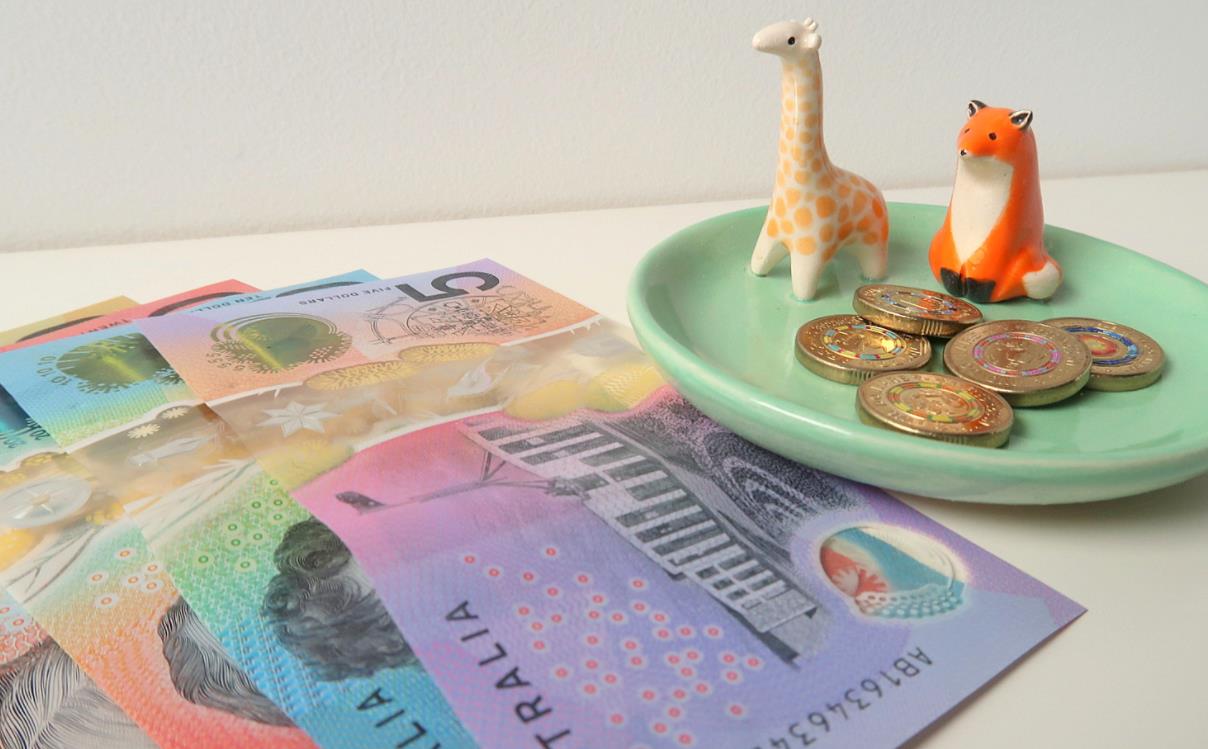人们不喜欢谈论金钱的 6 个原因
正文翻译

Many people avoid talking about money. That’s because many generally don’t like talking about it.
许多人避免谈论钱。这是因为许多人通常不喜欢谈论它。
Some of us never bring up our personal finances. Some are quick to change the subject when it comes up.
我们中的一些人从不提及自己的个人财务状况。有些人一提到这个话题就会迅速转移话题。
Some of us feel awkward, embarrassed, angry or guilty talking about money even with friends and family. After all, money is a sensitive topic – salaries, spending habits and savings are very personal things.
即使是和朋友和家人谈论钱,我们中的一些人也会感到尴尬或生气。毕竟,钱是一个敏感的话题——薪水、消费习惯和存款都是非常私人的事情。
Often money is seen as a taboo topic that carries stigma like sex, politics and religion.
金钱通常被视为禁忌话题,像性、政治和宗教一样带有污名。
It seems Australians find it hard to talk about money. A survey in 2016 found almost half of Australians avoid talking about personal finances. Another survey in 2018 found two thirds of Australian parents are reluctant to talk about money to their children.
澳大利亚人似乎很少谈论金钱。2016年的一项调查发现,近一半的澳大利亚人避免谈论个人财务状况。2018年的另一项调查发现,三分之二的澳大利亚父母不愿与孩子谈论金钱。
I’ve always had an interest in money and don’t mind discussing personal finances with those I trust. Growing up money was discussed openly in my Chinese family as wealth is pride in Chinese culture.
我一直对钱的话题很感兴趣,不介意与我信任的人讨论个人财务状况。在我成长的中国家庭里,钱是可以公开讨论的话题,因为财富是中国文化的骄傲。
Most others around me, however, tend to keep their financial achievements and struggles secret.
然而,我周围的大多数人都倾向于对自己的经济成就和奋斗历程守口如瓶。
There are valid reasons why some prefer not to talk about money, and here are some of them.
有些人不喜欢谈论钱是有正当理由的,这里是我总结的一些理由。
1. Judgement
1. 评判
We don’t talk about money because we don’t want to be judged for our financial choices or circumstances.
我们不谈论钱,因为我们不想因为我们的财务状况而被评判。
People can be quick to judge based on first-impressions or stereotypes. Our financial situation doesn’t necessarily reflect our values and self-worth.
人们很容易根据第一印象或刻板印象做出判断。但我们的财务状况不一定能真实反映我们的价值观和自我价值。
There’s often the misconception that the more you earn, the better off your life is. After all, how much we earn can determine if we can afford certain luxuries.
通常人们会认为你挣得越多,你的生活就越好。毕竟,我们挣多少钱决定了我们是否买得起某些奢侈品,但这是一种误解。
That said, if you go out every weekend or buy designer clothing all the time, it doesn’t necessarily mean you aren’t living paycheck to paycheck. Even if you are, that’s your choice.
也就是说,如果你每个周末都出去玩,或者总是买名牌衣服,这并不一定意味着你不是靠薪水过日子的。即使你是,那也是你自己的选择。
If you earn below the average income in a developing country, it doesn’t mean you aren’t hardworking or don’t have an emergency fund.
如果你的收入低于发展中国家的平均收入,这也并不意味着你不努力或没有应急资金。
Everyone has different salaries and habits – different financial outlooks for different lifestyles.
每个人都有不同的薪水和习惯——不同的生活方式对财务前景有不同的需求。
2. Offending others
2. 会冒犯别人
Money is tied to the notion of status, class and privilege. Talking about money with people who don’t understand your lifestyle might make them feel bad or annoyed. They might also behave differently around you.
金钱总是会与地位、阶级和特权的概念联系在一起。和不了解你生活方式的人谈论金钱可能会让他们感觉生气或恼火。如果你说出了自己的财务状况,在你身边的人也可能会变得不一样。
For instance, if you earn a modest income or prefer to live on welfare payments, you might get looked down upon by corporate high-flying career-types.
例如,如果你收入不高,或者更喜欢靠福利生活,你可能会被公司里有抱负的上进者所看不起。
Bragging about one’s wealth in an upmanship manner is crass. It can be triggering, making those who earn less feel like they don’t belong and discriminated because of financial wealth they don’t have.
而以一种自命不凡的方式吹嘘自己拥有的财富同样是粗鲁的。这可能会让那些收入较低的人觉得自己不属于这里,让他们觉得自己因没有财富而受到了歧视。
On the flipside, high-income earners might feel annoyed at having to fund welfare or disability payments with their taxpayer dollars, feeling others are mooching off of them. At times they might also be a target of crime if they talk about their wealth to the wrong people.
而另一方面,高收入者可能会对自己纳税的钱被用来支付其他人的福利或残疾补贴而感到恼火,觉得其他人占了自己的便宜。有时,如果他们向错误的人谈论自己拥有的财富,他们甚至可能会成为犯罪的目标。
When I was much younger, wilder and unemployed, I lived off welfare payments for a while. To qualify for the payments, job-seeking classes were mandatory which I attended. Sometimes you got to do what you got to do to pay the bills.
当我还很年轻、很狂野,处于失业阶段的时候,有一段时间我靠福利过活。为了有资格获得这笔钱,我必须参加求职课程。有时候,为了支付账单,你必须做你该做的事。
3. No one really is a professional
3.没有人是真正的专业人士
Financial advice from a financial advisor or your friend is just an opinion. That advice won’t guarantee you financial freedom.
来自财务顾问或朋友的财务建议只是一种建议,这个建议并不能保证让你实现财务自由。
Everyone’s life, goals and circumstances are unique. Financial advice that works for someone might not work for you.
每个人的生活目标和生活状况都是独一无二的。对别人有用的理财建议不一定对你有用。
As such people might be hesitant talking about personal finances for fear of causing someone else’s financial downfall. Who knows if someone might take your investing recommendations like gospel without doing their own research and end up with an entire portfolio in the red.
因此,人们在谈论个人财务时可能会犹豫,因为担心会导致别人的财务崩溃。谁知道会不会有人把你的投资建议当成福音,而不做自己的研究,最终导致投资出现亏损。
Also, the volatile economy and certainties in life can change at the drop of a hat. That can make some of us even more reluctant to share money tips. Money tips that worked previously might not work now.
此外,生活中充满不确定性,经济趋势也可能瞬间发生变化。这可能会让我们中的一些人更不愿意分享理财秘诀。因为以前有用的理财技巧现在可能不管用了。
4. Tradition
4. 传统
Sometimes people never grew up talking about money. So they don’t ever talk about it, keeping with tradition.
有时候人们从小就不谈钱。所以他们会保持传统,从不谈论它。
Some might have been discouraged from talking about money when they were younger. After all, childhood and teenage years are usually carefree times. Some parents rather not have kids stress over the math of compound interest or taxes.
有些人在小的时候可能被劝阻不要谈论金钱。毕竟,童年和青少年时期通常是无忧无虑的。有些父母不愿意让孩子们为复利或税收等的数学计算而感到压力。
My Chinese parents were the exact opposite. Throughout school dad encouraged me to read the Australian Financial Review and keep up with current affairs to make sense of the stock market highs and lows.
而我的中国父母则完全相反。上学期间,我的爸爸鼓励我阅读《澳大利亚金融评论》,关注时事,了解股市的涨跌。
The habit of saving over spending was also drilled into me back then. My folks got me an orange Dollarmite money box as a kid and encouraged me to feed it coins every day after school.
那时候,我也养成了省吃俭用的习惯。当我还是个孩子的时候,我的父母给了我一个橙色的储钱罐,并鼓励我每天放学后给它喂硬币。
In general, wealth is a marker of success in Chinese cultures that’s why some Chinese talk openly about building wealth.
总的来说,在中国文化中,财富是成功的标志,这就是为什么一些中国人喜欢公开谈论如何积累财富。
5. Stress
5. 压力
There are many aspects about personal finance. Talking about it can be overwhelming, not knowing where to start.
个人理财包含很多方面。谈论它可能会让人不知所措,不知道从哪里开始讲起。
There’s earning, saving, spending, and paying off debt such as student loans. Then there’s also setting up an emergency fund. Funding a retirement fund. Saving funds to support loved ones. Predicting future inflation. Setting aside for medical expenses. Diversifying investment portfolios and income streams. And more.
它包含赚钱、储蓄、消费和偿还债务,比如学生贷款。除此之外,还要攒下一笔应急资金,用来支付将来退休、赡养亲人、可能出现的通货膨胀、医疗等所需的费用。它还包括多样化的投资组合和收入来源以及更多专业性的内容。
Adding to that, money doesn’t fall from the sky for free every day.
此外,钱也并不是每天都会从天上掉下来的。
6. Right to privacy
6. 隐私权
Everyone has the right to keep their finances and financial habits to themselves. How much you make and spend is no one else’s business.
每个人都有权对自己的财务状况和理财习惯保密。你赚多少钱,花多少钱,这不关别人的事。
To simply put it, not all of us are comfortable revealing our money habits.
简单地说,并不是所有人都愿意暴露自己的理财习惯。
The more you talk about your personal finances, the more you reveal about yourself. That can set you up to not just be a target of crime but also identity theft.
你谈论你的个人财务越多,你就越会暴露你自己的隐私。这不仅会让你成为犯罪的目标,还会让你的身份被盗用。
So best to be mindful with whom you talk money with.
所以你最好留心你在和谁谈钱。
* * *
Going back to the notion of privilege, some are born with certain privileges.
回到特权的概念,有些人天生就有某些特权。
It has been suggested ‘privilege is having advantages that others don’t have. Privilege comes into play in nearly every situation when it comes to money.’ For instance, who you are determines the student loans you pay and the salary you earn.
有人认为“特权”是拥有别人没有的优势。当涉及到金钱时,特权几乎在任何情况下都起作用。比如,你的身份决定了你要付的学生贷款和你挣的薪水。
If you’re born into a white middle-class family in the modern Western world, chances are it’s easier to get more opportunities and accumulate wealth – work less and afford spending and travels fairly easily.
如果你出生在现代西方世界的一个白人中产阶级家庭,那么你很可能更容易获得更多的机会积累财富——更少的工作量,更多的消费选择和旅行机会。
If you’re from a place where you work multiple jobs to make ends meet, or from a minority group, it can be harder to get ahead with money – and maybe it’s harder to talk about money.
而如果你来自一个需要做多份工作来维持生计的国家,或者来自一个少数群体,那么你就很难积累财富——也许谈论钱就更难了。
As such, conversations about personal finances will be different for different people depending on one’s privilege. Everyone will have a different perspective about managing finances.
因此,对于不同的人来说,有关个人财务的谈话会因其有人拥有特权而有所不同。每个人对理财都有不同的看法。
I remember the job-seeking classes were demoralising. It was hard to focus. There were students of all backgrounds: some seemed high. A middle-aged guy taught English overseas for years, wore a business suit each class and took a raggedly-looking classmate to buy decent interview clothes. Others kept interrupting the tutor.
我记得求职培训让人意志消沉,很难集中注意力。因为学生的背景各不相同,有些人似乎很有钱。一个在海外教了多年英语的中年人,每次上课都穿着商务套装,还带着一位衣衫褴褛的同学去买体面的面试服装。还有人不停地打断辅导老师的讲课。
That experience taught me some of us will always do it tough financially. Halfway through the course, I was offered a job in a call centre. I didn’t want the job. Not my kind of field. But I took it and left the course to earn a living.
那次经历教会了我,我们中的一些人在经济上总是会遇到困难。课程进行到一半时,我在一家客服中心找到了一份工作。我不想要这份工作,这不是我擅长的领域。但我还是接受了,并离开了培训班,开始谋生。
Notably, working hard doesn’t guarantee you’ll be financially independent in the long term. Also, your life priorities and financial priorities will change throughout life.
值得注意的是,努力工作并不能保证你在长期内经济状况充裕,因为你的生活优先级和财务优先级也会随着时间而发生改变。
It’s important to talk about money, such as spending habits, ways to save and investment strategies. That way you can make informed financial decisions and develop a healthy relationship with money to suit your lifestyle.
谈论金钱很重要,比如消费习惯、储蓄方式和投资策略。这样你就可以做出明智的财务决定,并与金钱建立健康的关系,以适应你的生活方式。
When talking about money, you don’t always have to get personal. Talking in general about saving, spending and investing can be both helpful and insightful.
在谈论钱的时候,你不必总是涉及个人隐私。你可以笼统地谈论储蓄、消费和投资理念,既能对人有所帮助,又能彰显自己的智慧。
As I wrote in Cheap, Cheap Asians, for me saving and having an emergency fund comes first. If I can save instead of spending, I will. I miss the days when I could get $1.50 luncheon meat fried rice and $1.50 nuggets for lunch from the school canteen in Singapore.
正如我在《节俭的亚洲人》一文中所写的,对我来说,存钱和拥有应急资金是排在第一位的。如果什么方法能让我省钱而不是花钱,我就会这么做。我怀念能在新加坡学校的食堂吃到1.5美元午餐肉炒饭和1.5美元炸鸡块的日子。
These days, money is more complicated – and it probably is for the average person as life goes on. Growing investments, paying off the mortgage and taking care of others are often on my mind. But there’s also fun in having the occasional go at sports betting, discussing wins and losses with friends.
如今,钱对我来说变得更复杂了——随着生活的发展,对其他普通人来说可能也是如此。增加投资、偿还抵押贷款和照顾他人经常浮现在我的脑海里。但偶尔买买体育彩票,与朋友讨论一下输赢也很有趣。
Typically it’s white men talking about money and managing finances in the public eye. More women and people of colour should be speaking up about money, encouraging others to be financial literate.
在公众面前谈论金钱和理财的通常是白人男性。但也应该鼓励有更多的女性和其他有色人种谈论金钱,让更多人了解财务知识。
No matter what background or culture we come from, we can all learn when we talk about money with each other.
无论我们来自什么背景或文化,我们都可以在彼此谈论金钱时学到一些东西。
Do you talk about money or personal finances?
你们会谈论金钱或个人财务状况吗?

Many people avoid talking about money. That’s because many generally don’t like talking about it.
许多人避免谈论钱。这是因为许多人通常不喜欢谈论它。
Some of us never bring up our personal finances. Some are quick to change the subject when it comes up.
我们中的一些人从不提及自己的个人财务状况。有些人一提到这个话题就会迅速转移话题。
Some of us feel awkward, embarrassed, angry or guilty talking about money even with friends and family. After all, money is a sensitive topic – salaries, spending habits and savings are very personal things.
即使是和朋友和家人谈论钱,我们中的一些人也会感到尴尬或生气。毕竟,钱是一个敏感的话题——薪水、消费习惯和存款都是非常私人的事情。
Often money is seen as a taboo topic that carries stigma like sex, politics and religion.
金钱通常被视为禁忌话题,像性、政治和宗教一样带有污名。
It seems Australians find it hard to talk about money. A survey in 2016 found almost half of Australians avoid talking about personal finances. Another survey in 2018 found two thirds of Australian parents are reluctant to talk about money to their children.
澳大利亚人似乎很少谈论金钱。2016年的一项调查发现,近一半的澳大利亚人避免谈论个人财务状况。2018年的另一项调查发现,三分之二的澳大利亚父母不愿与孩子谈论金钱。
I’ve always had an interest in money and don’t mind discussing personal finances with those I trust. Growing up money was discussed openly in my Chinese family as wealth is pride in Chinese culture.
我一直对钱的话题很感兴趣,不介意与我信任的人讨论个人财务状况。在我成长的中国家庭里,钱是可以公开讨论的话题,因为财富是中国文化的骄傲。
Most others around me, however, tend to keep their financial achievements and struggles secret.
然而,我周围的大多数人都倾向于对自己的经济成就和奋斗历程守口如瓶。
There are valid reasons why some prefer not to talk about money, and here are some of them.
有些人不喜欢谈论钱是有正当理由的,这里是我总结的一些理由。
1. Judgement
1. 评判
We don’t talk about money because we don’t want to be judged for our financial choices or circumstances.
我们不谈论钱,因为我们不想因为我们的财务状况而被评判。
People can be quick to judge based on first-impressions or stereotypes. Our financial situation doesn’t necessarily reflect our values and self-worth.
人们很容易根据第一印象或刻板印象做出判断。但我们的财务状况不一定能真实反映我们的价值观和自我价值。
There’s often the misconception that the more you earn, the better off your life is. After all, how much we earn can determine if we can afford certain luxuries.
通常人们会认为你挣得越多,你的生活就越好。毕竟,我们挣多少钱决定了我们是否买得起某些奢侈品,但这是一种误解。
That said, if you go out every weekend or buy designer clothing all the time, it doesn’t necessarily mean you aren’t living paycheck to paycheck. Even if you are, that’s your choice.
也就是说,如果你每个周末都出去玩,或者总是买名牌衣服,这并不一定意味着你不是靠薪水过日子的。即使你是,那也是你自己的选择。
If you earn below the average income in a developing country, it doesn’t mean you aren’t hardworking or don’t have an emergency fund.
如果你的收入低于发展中国家的平均收入,这也并不意味着你不努力或没有应急资金。
Everyone has different salaries and habits – different financial outlooks for different lifestyles.
每个人都有不同的薪水和习惯——不同的生活方式对财务前景有不同的需求。
2. Offending others
2. 会冒犯别人
Money is tied to the notion of status, class and privilege. Talking about money with people who don’t understand your lifestyle might make them feel bad or annoyed. They might also behave differently around you.
金钱总是会与地位、阶级和特权的概念联系在一起。和不了解你生活方式的人谈论金钱可能会让他们感觉生气或恼火。如果你说出了自己的财务状况,在你身边的人也可能会变得不一样。
For instance, if you earn a modest income or prefer to live on welfare payments, you might get looked down upon by corporate high-flying career-types.
例如,如果你收入不高,或者更喜欢靠福利生活,你可能会被公司里有抱负的上进者所看不起。
Bragging about one’s wealth in an upmanship manner is crass. It can be triggering, making those who earn less feel like they don’t belong and discriminated because of financial wealth they don’t have.
而以一种自命不凡的方式吹嘘自己拥有的财富同样是粗鲁的。这可能会让那些收入较低的人觉得自己不属于这里,让他们觉得自己因没有财富而受到了歧视。
On the flipside, high-income earners might feel annoyed at having to fund welfare or disability payments with their taxpayer dollars, feeling others are mooching off of them. At times they might also be a target of crime if they talk about their wealth to the wrong people.
而另一方面,高收入者可能会对自己纳税的钱被用来支付其他人的福利或残疾补贴而感到恼火,觉得其他人占了自己的便宜。有时,如果他们向错误的人谈论自己拥有的财富,他们甚至可能会成为犯罪的目标。
When I was much younger, wilder and unemployed, I lived off welfare payments for a while. To qualify for the payments, job-seeking classes were mandatory which I attended. Sometimes you got to do what you got to do to pay the bills.
当我还很年轻、很狂野,处于失业阶段的时候,有一段时间我靠福利过活。为了有资格获得这笔钱,我必须参加求职课程。有时候,为了支付账单,你必须做你该做的事。
3. No one really is a professional
3.没有人是真正的专业人士
Financial advice from a financial advisor or your friend is just an opinion. That advice won’t guarantee you financial freedom.
来自财务顾问或朋友的财务建议只是一种建议,这个建议并不能保证让你实现财务自由。
Everyone’s life, goals and circumstances are unique. Financial advice that works for someone might not work for you.
每个人的生活目标和生活状况都是独一无二的。对别人有用的理财建议不一定对你有用。
As such people might be hesitant talking about personal finances for fear of causing someone else’s financial downfall. Who knows if someone might take your investing recommendations like gospel without doing their own research and end up with an entire portfolio in the red.
因此,人们在谈论个人财务时可能会犹豫,因为担心会导致别人的财务崩溃。谁知道会不会有人把你的投资建议当成福音,而不做自己的研究,最终导致投资出现亏损。
Also, the volatile economy and certainties in life can change at the drop of a hat. That can make some of us even more reluctant to share money tips. Money tips that worked previously might not work now.
此外,生活中充满不确定性,经济趋势也可能瞬间发生变化。这可能会让我们中的一些人更不愿意分享理财秘诀。因为以前有用的理财技巧现在可能不管用了。
4. Tradition
4. 传统
Sometimes people never grew up talking about money. So they don’t ever talk about it, keeping with tradition.
有时候人们从小就不谈钱。所以他们会保持传统,从不谈论它。
Some might have been discouraged from talking about money when they were younger. After all, childhood and teenage years are usually carefree times. Some parents rather not have kids stress over the math of compound interest or taxes.
有些人在小的时候可能被劝阻不要谈论金钱。毕竟,童年和青少年时期通常是无忧无虑的。有些父母不愿意让孩子们为复利或税收等的数学计算而感到压力。
My Chinese parents were the exact opposite. Throughout school dad encouraged me to read the Australian Financial Review and keep up with current affairs to make sense of the stock market highs and lows.
而我的中国父母则完全相反。上学期间,我的爸爸鼓励我阅读《澳大利亚金融评论》,关注时事,了解股市的涨跌。
The habit of saving over spending was also drilled into me back then. My folks got me an orange Dollarmite money box as a kid and encouraged me to feed it coins every day after school.
那时候,我也养成了省吃俭用的习惯。当我还是个孩子的时候,我的父母给了我一个橙色的储钱罐,并鼓励我每天放学后给它喂硬币。
In general, wealth is a marker of success in Chinese cultures that’s why some Chinese talk openly about building wealth.
总的来说,在中国文化中,财富是成功的标志,这就是为什么一些中国人喜欢公开谈论如何积累财富。
5. Stress
5. 压力
There are many aspects about personal finance. Talking about it can be overwhelming, not knowing where to start.
个人理财包含很多方面。谈论它可能会让人不知所措,不知道从哪里开始讲起。
There’s earning, saving, spending, and paying off debt such as student loans. Then there’s also setting up an emergency fund. Funding a retirement fund. Saving funds to support loved ones. Predicting future inflation. Setting aside for medical expenses. Diversifying investment portfolios and income streams. And more.
它包含赚钱、储蓄、消费和偿还债务,比如学生贷款。除此之外,还要攒下一笔应急资金,用来支付将来退休、赡养亲人、可能出现的通货膨胀、医疗等所需的费用。它还包括多样化的投资组合和收入来源以及更多专业性的内容。
Adding to that, money doesn’t fall from the sky for free every day.
此外,钱也并不是每天都会从天上掉下来的。
6. Right to privacy
6. 隐私权
Everyone has the right to keep their finances and financial habits to themselves. How much you make and spend is no one else’s business.
每个人都有权对自己的财务状况和理财习惯保密。你赚多少钱,花多少钱,这不关别人的事。
To simply put it, not all of us are comfortable revealing our money habits.
简单地说,并不是所有人都愿意暴露自己的理财习惯。
The more you talk about your personal finances, the more you reveal about yourself. That can set you up to not just be a target of crime but also identity theft.
你谈论你的个人财务越多,你就越会暴露你自己的隐私。这不仅会让你成为犯罪的目标,还会让你的身份被盗用。
So best to be mindful with whom you talk money with.
所以你最好留心你在和谁谈钱。
* * *
Going back to the notion of privilege, some are born with certain privileges.
回到特权的概念,有些人天生就有某些特权。
It has been suggested ‘privilege is having advantages that others don’t have. Privilege comes into play in nearly every situation when it comes to money.’ For instance, who you are determines the student loans you pay and the salary you earn.
有人认为“特权”是拥有别人没有的优势。当涉及到金钱时,特权几乎在任何情况下都起作用。比如,你的身份决定了你要付的学生贷款和你挣的薪水。
If you’re born into a white middle-class family in the modern Western world, chances are it’s easier to get more opportunities and accumulate wealth – work less and afford spending and travels fairly easily.
如果你出生在现代西方世界的一个白人中产阶级家庭,那么你很可能更容易获得更多的机会积累财富——更少的工作量,更多的消费选择和旅行机会。
If you’re from a place where you work multiple jobs to make ends meet, or from a minority group, it can be harder to get ahead with money – and maybe it’s harder to talk about money.
而如果你来自一个需要做多份工作来维持生计的国家,或者来自一个少数群体,那么你就很难积累财富——也许谈论钱就更难了。
As such, conversations about personal finances will be different for different people depending on one’s privilege. Everyone will have a different perspective about managing finances.
因此,对于不同的人来说,有关个人财务的谈话会因其有人拥有特权而有所不同。每个人对理财都有不同的看法。
I remember the job-seeking classes were demoralising. It was hard to focus. There were students of all backgrounds: some seemed high. A middle-aged guy taught English overseas for years, wore a business suit each class and took a raggedly-looking classmate to buy decent interview clothes. Others kept interrupting the tutor.
我记得求职培训让人意志消沉,很难集中注意力。因为学生的背景各不相同,有些人似乎很有钱。一个在海外教了多年英语的中年人,每次上课都穿着商务套装,还带着一位衣衫褴褛的同学去买体面的面试服装。还有人不停地打断辅导老师的讲课。
That experience taught me some of us will always do it tough financially. Halfway through the course, I was offered a job in a call centre. I didn’t want the job. Not my kind of field. But I took it and left the course to earn a living.
那次经历教会了我,我们中的一些人在经济上总是会遇到困难。课程进行到一半时,我在一家客服中心找到了一份工作。我不想要这份工作,这不是我擅长的领域。但我还是接受了,并离开了培训班,开始谋生。
Notably, working hard doesn’t guarantee you’ll be financially independent in the long term. Also, your life priorities and financial priorities will change throughout life.
值得注意的是,努力工作并不能保证你在长期内经济状况充裕,因为你的生活优先级和财务优先级也会随着时间而发生改变。
It’s important to talk about money, such as spending habits, ways to save and investment strategies. That way you can make informed financial decisions and develop a healthy relationship with money to suit your lifestyle.
谈论金钱很重要,比如消费习惯、储蓄方式和投资策略。这样你就可以做出明智的财务决定,并与金钱建立健康的关系,以适应你的生活方式。
When talking about money, you don’t always have to get personal. Talking in general about saving, spending and investing can be both helpful and insightful.
在谈论钱的时候,你不必总是涉及个人隐私。你可以笼统地谈论储蓄、消费和投资理念,既能对人有所帮助,又能彰显自己的智慧。
As I wrote in Cheap, Cheap Asians, for me saving and having an emergency fund comes first. If I can save instead of spending, I will. I miss the days when I could get $1.50 luncheon meat fried rice and $1.50 nuggets for lunch from the school canteen in Singapore.
正如我在《节俭的亚洲人》一文中所写的,对我来说,存钱和拥有应急资金是排在第一位的。如果什么方法能让我省钱而不是花钱,我就会这么做。我怀念能在新加坡学校的食堂吃到1.5美元午餐肉炒饭和1.5美元炸鸡块的日子。
These days, money is more complicated – and it probably is for the average person as life goes on. Growing investments, paying off the mortgage and taking care of others are often on my mind. But there’s also fun in having the occasional go at sports betting, discussing wins and losses with friends.
如今,钱对我来说变得更复杂了——随着生活的发展,对其他普通人来说可能也是如此。增加投资、偿还抵押贷款和照顾他人经常浮现在我的脑海里。但偶尔买买体育彩票,与朋友讨论一下输赢也很有趣。
Typically it’s white men talking about money and managing finances in the public eye. More women and people of colour should be speaking up about money, encouraging others to be financial literate.
在公众面前谈论金钱和理财的通常是白人男性。但也应该鼓励有更多的女性和其他有色人种谈论金钱,让更多人了解财务知识。
No matter what background or culture we come from, we can all learn when we talk about money with each other.
无论我们来自什么背景或文化,我们都可以在彼此谈论金钱时学到一些东西。
Do you talk about money or personal finances?
你们会谈论金钱或个人财务状况吗?
评论翻译
Financial Perception
Great article! Your content in this definitely sheds light on why there’s a discord when people talk about money. I’ve spoken about personal finance with my partner but she shuts down and disengages after 10 seconds , it’s more of a long term campaign in talking about it. when we have kids I will also encourage my children to read the AFR and personal finance blogs so they can have a strong start to their lives.
好文章!你在这篇文章中的内容明确说明了为什么人们在谈论金钱时会产生不和。我曾和我的伴侣谈论过个人理财,但她在10秒后就闭口不谈了,谈论这个话题更像是一场需要长期坚持的运动。当我们有了孩子,我也会鼓励我的孩子阅读金融书籍和个人理财博客,这样他们就可以有一个良好的开端。
Mabel Kwong
Thanks. That is great you tried talking about personal finance with your partner although she doesn’t want to engage. At least you tried A good knowledge of money matters (at the very least how to budget, spend, save and invest within your means) is important in life. More often than not money and how much money we have and acquire impacts on different facets of our lives. Maybe one day you might be able to have an engaging conversation about money with your partner
谢谢。虽然你的伴侣不想参与,但你尝试与她谈论个人财务问题,这很好。至少你尝试过了。对金钱的良好认知(至少是如何在自己的能力范围内进行预算、消费、储蓄和投资)在生活中是很重要的。金钱以及我们拥有和获得多少金钱往往会影响我们生活的方方面面。也许有一天,你能和你的伴侣就金钱问题进行一场引人入胜的对话。
lexklein
I do want to talk about money … your extra colorful Australian money! I wish our currency and coins were so beautiful and cheerful.
But to be serious, I was taught that talking about money was not polite, so I rarely discussed it then and have hung onto that preference over the years. Nowadays, however, people talk about EVERYTHING we didn’t used to: money, politics, religion, sex, plastic surgery, weight, etc. There seem to be fewer secrets these days, and I find that both good and bad. For the most part, I wish we could go back to less bragging, salesmanship, posturing, and TMI in general! I do think openness with one’s kids has changed, and I largely think that is OK. We did talk with our kids about money in some contexts, and I think it helped them understand what they needed to do financially, especially since we were the annoying parents who said they were on their own the minute they graduated from college!
我确实想谈谈钱......你们澳大利亚的钱特别的五颜六色!我真希望我们的货币和硬币的颜色也能这么漂亮和明快。不过说正经的,我从小就被教育谈论钱是不礼貌的,所以那时我很少谈论钱,多年来也一直坚持着这种偏好。然而,如今人们谈论的一切,都是我们过去不曾谈论过的:金钱、政治、宗教、性、整容、体重等等。现在的秘密似乎越来越少了,我觉得这既是好事也是坏事。在大多数情况下,我希望我们能回到少吹嘘、少推销、少装腔作势的时代!我确实认为,与孩子们坦诚相待的方式已经改变,而且我认为这在很大程度上是可以接受的。在某些情况下,我们确实会和孩子们谈论钱的问题,我认为这有助于他们了解自己在经济上需要做些什么,尤其是因为我们是令人讨厌的父母,经常对他们说他们大学一毕业就得靠自己!
Simon
I think I also had that upbringing of discussion of money being impolite. It probably stems from that perception of people getting offended if they learn they are not earning as much as others.
我想我的成长经历中也经常听人说讨论金钱是不礼貌的。这可能源于人们在得知自己收入不如别人时会感到被冒犯。
Mabel Kwong
That is a good point. People can be so easily offended when their lifestyles and financial positions aren’t similar. Stereotypes are still so prent these days.
说得好。当生活方式和经济状况各不相同时,人们很容易被冒犯。所以如今,这些陈旧的观念仍然如此盛行。
Mabel Kwong
Yes, Australian currency does look bright and cheery. I didn’t actually realise that until I pulled out these notes. These notes were released a few years ago, so I think that’s why they still look fresh. From what I have seen in movies and just reading generally, American currency carries more muted, neutral tones.
That is a good way to put it, that talking about money is not polite – it can be seen as being nosy about someone. It sounds like you educated your kids about money, and showing them options on handling it.
是的,澳大利亚的货币看起来确实很鲜艳、明快。其实我也是拿出这些纸币才意识到这一点的。这些纸币是几年前才发行的,所以我想这也是它们看起来依然新鲜的原因。根据我在电影和阅读中看到的,美国货币的色调比较柔和、中性。是的,谈论钱是不礼貌的--这可能会被视为对某人的八卦。听起来你向孩子们传授了关于金钱的知识,并告诉他们如何处理它。
Bama
In my case it’s mostly cultural. I feel that in Javanese society, talking about money is a big taboo, and if you really have to, you must do it in private. As an adult, I usually adjust to the person I talk to. If he/she is comfortable with it, then I’ll be candid myself. However, there are only a handful of people with whom I can openly discuss about this.
就我而言,我认为这主要是文化因素。在爪哇,谈钱是大忌,如果实在要谈,必须私下谈。作为成年人,我通常会根据谈话对象的情况进行调整。如果他/她能接受,那我也会坦诚相待。不过,能和我公开讨论这个问题的人屈指可数。
Mabel Kwong
That is interesting to hear that in Central Javanese society money isn’t usually talked about openly. I am also the same – if the other person is comfortable talking about money, I am happy to discuss it with them – even if it means talking about it generally and not disclosing personal financial figures.
在中爪哇,人们通常不会公开谈论金钱,这一点很有意思。我也是一样--如果对方愿意谈论钱,我很乐意和他们讨论--哪怕是泛泛而谈,不透露个人的财务数字。
AutumnAshbough on 5
In my white family, discussing money is absolutely taboo. We never say how much something cost or how much money we make, or discuss rent, etc.
The first time I met my future Chinese-American in-laws, they interrogated me on the cost of my rent and told me how much money I could save if I moved in with their son. I was mortified, but it is hilarious in retrospect, and also rather flattering.
I’ve changed my view on monetary discussions enough that now I think I make my white family uncomfortable.
在我的白人家庭里,讨论钱是绝对的禁忌。我们从不说某样东西花了多少钱或我们赚了多少钱,也不讨论房租等问题。我第一次见到我未来的华裔公婆时,他们盘问了我的房租费用,并告诉我,如果我搬去和他们的儿子一起住,可以省下多少钱。我当时很尴尬,但现在回想起来却觉得很好笑,也很受宠若惊。我已经改变了对讨论金钱的看法,现在我觉得我反倒让我的白人家庭很不适应了。
Mabel Kwong
It really does sound mortifying being interrogated by the in-laws about your finances. Sounded like some kind of test you had to pass. Moving in with someone and having a kid, saving money becomes so much harder. To be honest, I got a hunch you impressed your in-laws.
I hope your white family becomes more settled with talking about money as time goes on.
被公婆盘问财务状况,听起来真的很让人尴尬。听起来像是你必须通过的某种考验。和别人同居并有了孩子,存钱就变得难上加难。老实说,我有一种直觉,你给公婆留下了深刻的印象。我希望随着时间的推移,你的白人家庭在谈论钱的问题上会变得更加开放。
AutumnAshbough
Oh, my family is hopeless. But as you point out in your post, talking about money with your kids is really important. Fiscal management is a life skill. People were shocked when I gave my kid an allowance at age 4 or 5, but he has to do chores to get it.
And he also has to pay for stuff he breaks.
哦,我的家庭无可救药。但正如你在帖子中指出的,与孩子们谈论金钱真的很重要。理财是一项生活技能。我的孩子四五岁的时候,我就开始给他零花钱,人们都很震惊,但他必须做家务才能拿到零花钱,而且他还得为自己弄坏的东西付钱。
Mabel Kwong
That is great your kid does chores and earns his way. Very responsible to pay for stuff he breaks too. But I guess there is no escaping the in-laws giving him red packet after red packet during Chinese New Year
你的孩子很会做家务,也很会赚钱。弄坏了东西要赔,这会让他很有责任感。不过我想在春节期间,你的岳父岳母会给他一个又一个红包
Simon
I know money is highly prized in Chinese culture. The giving of money on Chinese New Year is something that I’ve had changing opinions of as I’ve grown up. I didn’t have much ‘pocket money’ as a kid so I used to prize what I got at CNY celebration. I understand that tradition warrants that as a bachelor I’m still eligible to receive these gifts but thankfully no-one offers them to me any more. Aside from that, I know everything seems to orient around money in traditional Chinese culture. Study hard to get a good job in order to support your family when you’re older. Nothing wrong with that and they are all good and wise things, but it can be taken to the extreme in many cases, at the expense of other things like feelings of self-worth before your family.
我知道钱在中国文化中是非常珍贵的。随着年龄的增长,我对春节送压岁钱的看法也在不断变化。我小时候没有多少"零花钱",所以我很珍惜在春节庆祝活动中得到的东西。我知道按照传统,作为单身汉,我仍然有资格收到这些礼物,但庆幸的是,再也没有人给我送压岁钱了。除此之外,我知道在中国的传统文化中,一切似乎都以金钱为导向。努力学习,找到一份好工作,以便长大后养家糊口。这些都没有错,也都是很好的明智之举,但在很多情况下,这可能会被发挥到极致,甚至以牺牲其他东西为代价,比如在家人面前的自尊。
Mabel Kwong
That is correct. If you are a bachelor or not in a married relationship then Chinese elders can feel entitled to give you pocket money or red packet during the Lunar New Year. To be honest, I much prefer receiving money as opposed to a half-thought out gift or gift that I don’t like. Times are definitely changing, tradition is changing, and not every Chinese kid is studying hard to make more money in the future or setting themselves up. Then again, as you mentioned there is this family expectation in Asian cultures – and maybe that will always be at the back of some of our minds.
这就对了。如果你是单身汉或者没有结婚,那么中国的长辈会觉得有权在春节期间给你零花钱或红包。老实说,我更喜欢收钱,而不是没有用的礼物或我不喜欢的礼物。时代肯定在变,传统也在变,不是每个中国孩子都在努力学习,将来赚更多的钱,也不是每个中国孩子都在为自己打拼。不过,正如你所提到的,亚洲文化中有一种家庭期望--也许这种期望会一直在我们的脑海中挥之不去。
Great article! Your content in this definitely sheds light on why there’s a discord when people talk about money. I’ve spoken about personal finance with my partner but she shuts down and disengages after 10 seconds , it’s more of a long term campaign in talking about it. when we have kids I will also encourage my children to read the AFR and personal finance blogs so they can have a strong start to their lives.
好文章!你在这篇文章中的内容明确说明了为什么人们在谈论金钱时会产生不和。我曾和我的伴侣谈论过个人理财,但她在10秒后就闭口不谈了,谈论这个话题更像是一场需要长期坚持的运动。当我们有了孩子,我也会鼓励我的孩子阅读金融书籍和个人理财博客,这样他们就可以有一个良好的开端。
Mabel Kwong
Thanks. That is great you tried talking about personal finance with your partner although she doesn’t want to engage. At least you tried A good knowledge of money matters (at the very least how to budget, spend, save and invest within your means) is important in life. More often than not money and how much money we have and acquire impacts on different facets of our lives. Maybe one day you might be able to have an engaging conversation about money with your partner
谢谢。虽然你的伴侣不想参与,但你尝试与她谈论个人财务问题,这很好。至少你尝试过了。对金钱的良好认知(至少是如何在自己的能力范围内进行预算、消费、储蓄和投资)在生活中是很重要的。金钱以及我们拥有和获得多少金钱往往会影响我们生活的方方面面。也许有一天,你能和你的伴侣就金钱问题进行一场引人入胜的对话。
lexklein
I do want to talk about money … your extra colorful Australian money! I wish our currency and coins were so beautiful and cheerful.
But to be serious, I was taught that talking about money was not polite, so I rarely discussed it then and have hung onto that preference over the years. Nowadays, however, people talk about EVERYTHING we didn’t used to: money, politics, religion, sex, plastic surgery, weight, etc. There seem to be fewer secrets these days, and I find that both good and bad. For the most part, I wish we could go back to less bragging, salesmanship, posturing, and TMI in general! I do think openness with one’s kids has changed, and I largely think that is OK. We did talk with our kids about money in some contexts, and I think it helped them understand what they needed to do financially, especially since we were the annoying parents who said they were on their own the minute they graduated from college!
我确实想谈谈钱......你们澳大利亚的钱特别的五颜六色!我真希望我们的货币和硬币的颜色也能这么漂亮和明快。不过说正经的,我从小就被教育谈论钱是不礼貌的,所以那时我很少谈论钱,多年来也一直坚持着这种偏好。然而,如今人们谈论的一切,都是我们过去不曾谈论过的:金钱、政治、宗教、性、整容、体重等等。现在的秘密似乎越来越少了,我觉得这既是好事也是坏事。在大多数情况下,我希望我们能回到少吹嘘、少推销、少装腔作势的时代!我确实认为,与孩子们坦诚相待的方式已经改变,而且我认为这在很大程度上是可以接受的。在某些情况下,我们确实会和孩子们谈论钱的问题,我认为这有助于他们了解自己在经济上需要做些什么,尤其是因为我们是令人讨厌的父母,经常对他们说他们大学一毕业就得靠自己!
Simon
I think I also had that upbringing of discussion of money being impolite. It probably stems from that perception of people getting offended if they learn they are not earning as much as others.
我想我的成长经历中也经常听人说讨论金钱是不礼貌的。这可能源于人们在得知自己收入不如别人时会感到被冒犯。
Mabel Kwong
That is a good point. People can be so easily offended when their lifestyles and financial positions aren’t similar. Stereotypes are still so prent these days.
说得好。当生活方式和经济状况各不相同时,人们很容易被冒犯。所以如今,这些陈旧的观念仍然如此盛行。
Mabel Kwong
Yes, Australian currency does look bright and cheery. I didn’t actually realise that until I pulled out these notes. These notes were released a few years ago, so I think that’s why they still look fresh. From what I have seen in movies and just reading generally, American currency carries more muted, neutral tones.
That is a good way to put it, that talking about money is not polite – it can be seen as being nosy about someone. It sounds like you educated your kids about money, and showing them options on handling it.
是的,澳大利亚的货币看起来确实很鲜艳、明快。其实我也是拿出这些纸币才意识到这一点的。这些纸币是几年前才发行的,所以我想这也是它们看起来依然新鲜的原因。根据我在电影和阅读中看到的,美国货币的色调比较柔和、中性。是的,谈论钱是不礼貌的--这可能会被视为对某人的八卦。听起来你向孩子们传授了关于金钱的知识,并告诉他们如何处理它。
Bama
In my case it’s mostly cultural. I feel that in Javanese society, talking about money is a big taboo, and if you really have to, you must do it in private. As an adult, I usually adjust to the person I talk to. If he/she is comfortable with it, then I’ll be candid myself. However, there are only a handful of people with whom I can openly discuss about this.
就我而言,我认为这主要是文化因素。在爪哇,谈钱是大忌,如果实在要谈,必须私下谈。作为成年人,我通常会根据谈话对象的情况进行调整。如果他/她能接受,那我也会坦诚相待。不过,能和我公开讨论这个问题的人屈指可数。
Mabel Kwong
That is interesting to hear that in Central Javanese society money isn’t usually talked about openly. I am also the same – if the other person is comfortable talking about money, I am happy to discuss it with them – even if it means talking about it generally and not disclosing personal financial figures.
在中爪哇,人们通常不会公开谈论金钱,这一点很有意思。我也是一样--如果对方愿意谈论钱,我很乐意和他们讨论--哪怕是泛泛而谈,不透露个人的财务数字。
AutumnAshbough on 5
In my white family, discussing money is absolutely taboo. We never say how much something cost or how much money we make, or discuss rent, etc.
The first time I met my future Chinese-American in-laws, they interrogated me on the cost of my rent and told me how much money I could save if I moved in with their son. I was mortified, but it is hilarious in retrospect, and also rather flattering.
I’ve changed my view on monetary discussions enough that now I think I make my white family uncomfortable.
在我的白人家庭里,讨论钱是绝对的禁忌。我们从不说某样东西花了多少钱或我们赚了多少钱,也不讨论房租等问题。我第一次见到我未来的华裔公婆时,他们盘问了我的房租费用,并告诉我,如果我搬去和他们的儿子一起住,可以省下多少钱。我当时很尴尬,但现在回想起来却觉得很好笑,也很受宠若惊。我已经改变了对讨论金钱的看法,现在我觉得我反倒让我的白人家庭很不适应了。
Mabel Kwong
It really does sound mortifying being interrogated by the in-laws about your finances. Sounded like some kind of test you had to pass. Moving in with someone and having a kid, saving money becomes so much harder. To be honest, I got a hunch you impressed your in-laws.
I hope your white family becomes more settled with talking about money as time goes on.
被公婆盘问财务状况,听起来真的很让人尴尬。听起来像是你必须通过的某种考验。和别人同居并有了孩子,存钱就变得难上加难。老实说,我有一种直觉,你给公婆留下了深刻的印象。我希望随着时间的推移,你的白人家庭在谈论钱的问题上会变得更加开放。
AutumnAshbough
Oh, my family is hopeless. But as you point out in your post, talking about money with your kids is really important. Fiscal management is a life skill. People were shocked when I gave my kid an allowance at age 4 or 5, but he has to do chores to get it.
And he also has to pay for stuff he breaks.
哦,我的家庭无可救药。但正如你在帖子中指出的,与孩子们谈论金钱真的很重要。理财是一项生活技能。我的孩子四五岁的时候,我就开始给他零花钱,人们都很震惊,但他必须做家务才能拿到零花钱,而且他还得为自己弄坏的东西付钱。
Mabel Kwong
That is great your kid does chores and earns his way. Very responsible to pay for stuff he breaks too. But I guess there is no escaping the in-laws giving him red packet after red packet during Chinese New Year
你的孩子很会做家务,也很会赚钱。弄坏了东西要赔,这会让他很有责任感。不过我想在春节期间,你的岳父岳母会给他一个又一个红包
Simon
I know money is highly prized in Chinese culture. The giving of money on Chinese New Year is something that I’ve had changing opinions of as I’ve grown up. I didn’t have much ‘pocket money’ as a kid so I used to prize what I got at CNY celebration. I understand that tradition warrants that as a bachelor I’m still eligible to receive these gifts but thankfully no-one offers them to me any more. Aside from that, I know everything seems to orient around money in traditional Chinese culture. Study hard to get a good job in order to support your family when you’re older. Nothing wrong with that and they are all good and wise things, but it can be taken to the extreme in many cases, at the expense of other things like feelings of self-worth before your family.
我知道钱在中国文化中是非常珍贵的。随着年龄的增长,我对春节送压岁钱的看法也在不断变化。我小时候没有多少"零花钱",所以我很珍惜在春节庆祝活动中得到的东西。我知道按照传统,作为单身汉,我仍然有资格收到这些礼物,但庆幸的是,再也没有人给我送压岁钱了。除此之外,我知道在中国的传统文化中,一切似乎都以金钱为导向。努力学习,找到一份好工作,以便长大后养家糊口。这些都没有错,也都是很好的明智之举,但在很多情况下,这可能会被发挥到极致,甚至以牺牲其他东西为代价,比如在家人面前的自尊。
Mabel Kwong
That is correct. If you are a bachelor or not in a married relationship then Chinese elders can feel entitled to give you pocket money or red packet during the Lunar New Year. To be honest, I much prefer receiving money as opposed to a half-thought out gift or gift that I don’t like. Times are definitely changing, tradition is changing, and not every Chinese kid is studying hard to make more money in the future or setting themselves up. Then again, as you mentioned there is this family expectation in Asian cultures – and maybe that will always be at the back of some of our minds.
这就对了。如果你是单身汉或者没有结婚,那么中国的长辈会觉得有权在春节期间给你零花钱或红包。老实说,我更喜欢收钱,而不是没有用的礼物或我不喜欢的礼物。时代肯定在变,传统也在变,不是每个中国孩子都在努力学习,将来赚更多的钱,也不是每个中国孩子都在为自己打拼。不过,正如你所提到的,亚洲文化中有一种家庭期望--也许这种期望会一直在我们的脑海中挥之不去。












